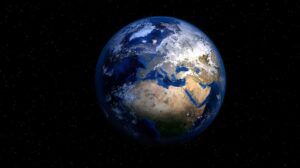In 2009, a team of internationally renowned scientists introduced ‘planetary boundaries’.
This framework was designed to communicate the limit to which humans could impact the Earth’s systems without disrupting its stability. The scientists were able to identify nine boundaries: climate change, biodiversity loss, ocean acidification, stratospheric ozone depletion, chemical pollution, freshwater consumption, land-use change, nitrogen and phosphorus pollution, air pollution and aerosol loading.
Operating with these boundaries would keep the entire planet stable while crossing them, may cause irremediable change for the Earth. Six of the nine boundaries are deemed to have been crossed already causing what is now defined as ‘Anthropocene’, a geological era in which humans have impacted the Earth’s geology and ecosystems to the point of changing its biosphere and impacting the systems that regulate its functioning. These changes to the biosphere have profound impacts on biodiversity, water quality and availability, and climate, just to name a few, in a way that may destabilise the entire planet.
To date, the Earth has been resilient and has absorbed these human-created impacts. For example, the ocean has been absorbing CO2 created by the burning of fossil fuels. The good news is that systems, such as our biosphere, tend by nature to be stable and maintain their status quo by resisting change.
The unwelcome news is there is a limit to this resiliency as systems can reach a tipping point at which their stability-seeking nature cannot maintain its equilibrium. The ocean is reaching its tipping point and becoming less efficient at absorbing CO2. It could even start releasing it into the atmosphere. How has this happened? Why is our ecosystem in such danger?
Missing information flow is one of the most common reasons for the malfunctioning of a system. If we measure our progress only in financial terms, for example by the revenues we can collectively generate the employment rate or some of the many other financial metrics, without considering the damage we are causing to the ecosystem, we are effectively ignoring the limits of the system we are operating in.
As Donella Meadows explained in Thinking in Systems, we tend to give more importance to what we can measure but ignore what we can’t, even when it may have catastrophic consequences. How can we measure the value of biodiversity loss or of ocean acidification?
It is hard to put a price tag on it, so we tend to discount it altogether. But it is an urgent time. We must pay attention to these critical systems, even if their value is not quantifiable as eventually the reality of the physical limits of our biosphere will catch up with us. Humankind cannot thrive on a destabilised planet.
So where does that leave us? We need to change. The multiple viewpoints of our lives must consider the limits of the Earth. We can do so as consumers, as employees, as citizens, as parents, but also as responsible investors. Our role is to invest in companies that have a sustainable long-term business approach. We seek to identify best practices and encourage companies to adopt them. Business can be done differently. We are seeing more companies take action on implementing business model transition plans that position them well
for the future while also protecting our planet. There are many examples of companies going beyond their legal obligation to recognise the value of the systems they rely on for success. For example, we have been in dialogue with a paper company preserving half of the land it owns for conservation purposes. We have been examining a large consumer staple company which has invested hundreds of millions of dollars to overhaul its supply chain to be able to source certain products from small farmers with better environmental practices rather than from companies that are typically linked to deforestation.
Sustainable investing helps shine the light on the road to change. As a community, we invest in companies that are leading the way, innovating business models, and changing the way business is done. Together we may all prosper within our planetary boundaries and not in spite of them.

